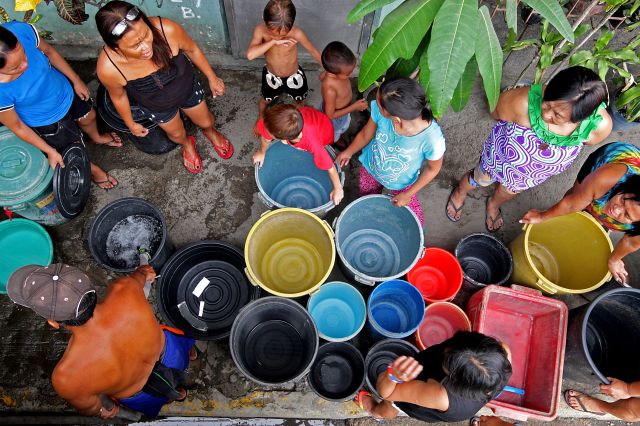MCWD water deficit now affects 50,000 households in Metro Cebu

The El Niño this year has reduced the water supply of Buhisan Dam (above) as seen during last March’s inspection of one of Cebu’s groundwater resources. At left, Barangay Tinago, Cebu City residents ready their water containers as they wait for the city government’s fire trucks to supply them water in this file photo.
CEBU CITY, Philippines – As the internal political strife surrounding the Metropolitan Cebu Water District or MCWD continues, the shortage of water faced by residents has also persisted.
Currently, the water deficit in the MCWD has now reached 50,000 cubic meters per day.
This equates to 50,000 households experiencing water supply issues, with each household facing a shortage of one cubic meter.
READ MORE:
Water crisis escalates in Cebu City: Bureaucratic delays hamper desalination projects
El Niño impact: 30M liters of water lost due to dry spell, says MCWD
MCWD ‘drama’: Gwen hits LWUA on ‘politics over water crisis’
3 dams operate only half of usual capacity
In an interview with MCWD spokesperson Minerva Gerodias on April 17, she said that all the main sources of water, specifically the three dams Buhisan, Lusaran, and Jaclupan, are currently operating at only half of their usual capacity due to the ongoing El Niño conditions.
The Buhisan dam, which usually produces 6,000 cubic meters per day, now only produces 3,000 cubic meters. The Jaclupan dam, which typically yields 30,000 cubic meters, is currently at only 14,000 cubic meters per day.
Similarly, the Lusaran dam, with a usual output of 30,000 cubic meters, is currently producing only 15,000 cubic meters.
Gerodias further noted that one water source in Compostela, delivering 10,000 cubic meters, has completely ceased delivery, as it can no longer supply any water.
“Ang amo na lang pasalamatan kay kaning amo source sa Carmen kay dili gyud kaayo siya ma affected sa El Niño. Among kontrata sa Carmen is 30,000 cubic meters per day, ni additional purchase mi og mga 5,000 cubic meters,” she said.
(We are grateful for your source in Carmen because they were not affected so much by the El Niño. Our contract with Carmen is 30,000 cubic meters per day, we made an additional purchase of 5,000 cubic meters.)
Underground water sources
Due to El Niño, these surface waters have been depleted. However, Gerodias said that there were no issues with the underground water sources, as they were unlikely to have been affected yet.
She noted, however, that if the El Niño would worsen, it could potentially become critical for the underground water sources too.
Gerodias stated that with the water deficit in their supply, the agency has balanced its distribution and prioritized areas experiencing difficulties with water supply.
READ MORE:
Task Force El Niño issues tips to save water during dry season
MCWD deploys mobile siphon tanks in 2 Cebu City barangays
Cebu City water crisis: Rama says no council approval needed for P96.94-M calamity funds
Water delivery trucks
She also said that they had deployed water trucks daily to extremely affected barangays experiencing drought in Cebu City, Mandaue City, and Talisay City. They conduct deliveries four times a day.
The water delivery schedule varies for each barangay. Some barangays receive deliveries on Mondays and Thursdays, while others have different days.
In Mandaue City, the areas covered included barangays Umapad, Opao, Alang-Alang, Looc, Subangdaku and the Mandaue market.
In Cebu City, areas such as Barangays Imus, Binaliw, San Jose, and Talamban are serviced.
Additionally, the BJMP has been provided with deliveries on Mondays, Wednesdays, and Fridays specifically for the jail.
Other areas served included the Barangays San Roque and Cansojong in Talisay City.
Mobile Siphon Tanks in mountain areas
Moreover, in the mountain barangays in CEBU CITY, Gerodias said they had deployed mobile siphon tanks (MSTs). They were installed in Barangays Cambinocot and Bonbon.
The MSTs in Cambinocot are valued at approximately P15 million. These tanks can produce up to 7 cubic meters of potable water per hour or a total of 168 cubic meters per day.
This potable water output can be shared with the residents of neighboring Barangays Pulangbato, Binaliw, and Sirao.
Furthermore, Gerodias said that a stationary MST installed in Bonbon produces 480 cubic meters of water per day or up to 20 cubic meters of potable water per hour.
This system serves residents in Barangays Buot, Pamutan, Subangdaku, and Babag.
Disclaimer: The comments uploaded on this site do not necessarily represent or reflect the views of management and owner of Cebudailynews. We reserve the right to exclude comments that we deem to be inconsistent with our editorial standards.
